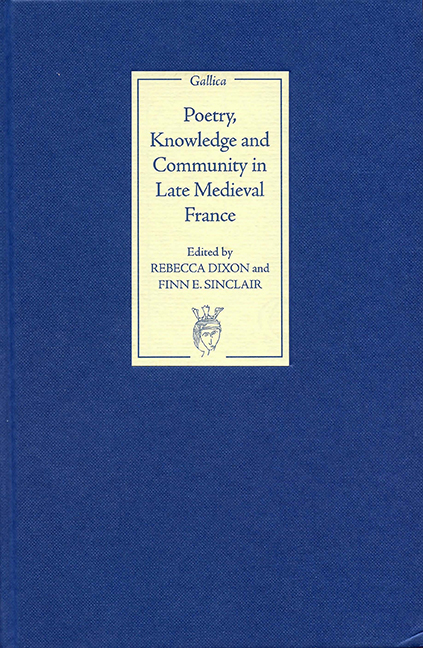Book contents
- Frontmatter
- Contents
- List of Illustrations
- List of Contributors
- Preface
- Introduction: L'Amour de Sophie. Poésie et savoir du Roman de la 1 Rose à Christine de Pizan
- PART I LEARNED POETRY/POETRY AND LEARNING
- Part II Poetry or Prose?
- Part III Poetic Communities
- 10 The Songs of Jehannot de Lescurel in Paris, BnF, MS fr. 146: Love Lyrics, Moral Wisdom and the Material Book
- 11 Refrains in the Jeu de Robin et Marion: History of a Citation
- 12 Le Prince chez Meschinot, mise en forme d'un objet poétique/ politique
- 13 Ways of Knowing in the Songe veritable and Christine de Pizan's Livre de l'Advision Cristine
- Conclusion: Knowing Poetry, Knowing Communities
- Bibliography
- Index
- Miscellaneous Endmatter
10 - The Songs of Jehannot de Lescurel in Paris, BnF, MS fr. 146: Love Lyrics, Moral Wisdom and the Material Book
from Part III - Poetic Communities
Published online by Cambridge University Press: 25 October 2017
- Frontmatter
- Contents
- List of Illustrations
- List of Contributors
- Preface
- Introduction: L'Amour de Sophie. Poésie et savoir du Roman de la 1 Rose à Christine de Pizan
- PART I LEARNED POETRY/POETRY AND LEARNING
- Part II Poetry or Prose?
- Part III Poetic Communities
- 10 The Songs of Jehannot de Lescurel in Paris, BnF, MS fr. 146: Love Lyrics, Moral Wisdom and the Material Book
- 11 Refrains in the Jeu de Robin et Marion: History of a Citation
- 12 Le Prince chez Meschinot, mise en forme d'un objet poétique/ politique
- 13 Ways of Knowing in the Songe veritable and Christine de Pizan's Livre de l'Advision Cristine
- Conclusion: Knowing Poetry, Knowing Communities
- Bibliography
- Index
- Miscellaneous Endmatter
Summary
Among the questions raised by the title, Poetry, Knowledge and Community in Late Medieval France, I have chosen one: how could the formal features of medieval French love lyrics and their contextualization in a material book be used to shape knowledge for a particular community of readers? One of the primary functions of verse in the vernacular works of the French Middle Ages (beyond the representation of the speaking voice) is to present knowledge, information and learning as moral wisdom. Paradoxically, medieval French love lyrics are not governed by the signifying practices of verse. Although they express moral judgments about their particular subject – opposing bone amor to felonie – medieval French love lyrics are courtly performance pieces most deeply expressive of technê, of knowledge as art rather than as learning, political wisdom, or spiritual truth. There are, of course, citations in vernacular motets which dig deep into written learning, yielding ‘seemingly endless layers of meaning’. But the impact of monophonic French love lyrics depends principally on their intense effect of psychological sincerity and their flaunting of poetic form rather than on allusions to learned, religious or classical traditions of knowledge.
As the courtly lyric enters into writing in the later thirteenth and the fourteenth century, however, the material book serves as a powerful technology for remotivating the vernacular lyric in new contexts through patterns of compilation that open the way for the love lyric to express high visions of knowledge as moral wisdom. Book compilation provides a change of footing for vernacular song, a shift of frame that could alter its significance. This is a period of extraordinary experimentation in ways poets and compilers could arrange lyrics in books in order to express moral knowledge. Notable examples include Dante's Convivio (c.1307) where the poet's love lyrics are embedded in philosophical commentary in Italian prose. Teodolinda Barolini shows how in Petrarch's Rime sparse (1327) the spiritual themes in the lyrics themselves are sustained by the compilational order of the canzioniere so that the material sequence of love lyrics marks out a moral progression towards conversion. Anne Walters Robertson uncovers the ‘schemes and patterns’ of Machaut's cycle of motets 1–19 (composed in the 1320s), where the interplay of citation and sequential order leads to a mystical scens.
- Type
- Chapter
- Information
- Poetry, Knowledge and Community in Late Medieval France , pp. 151 - 172Publisher: Boydell & BrewerPrint publication year: 2008

